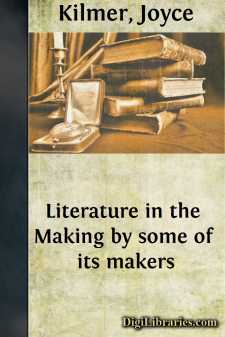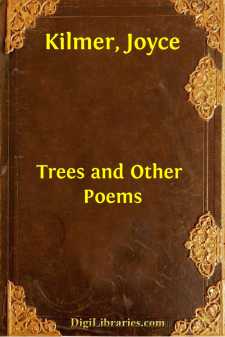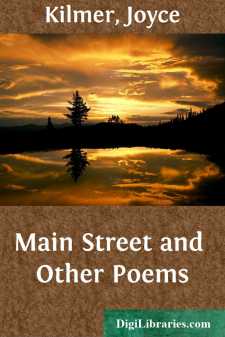Categories
- Antiques & Collectibles 13
- Architecture 36
- Art 48
- Bibles 22
- Biography & Autobiography 813
- Body, Mind & Spirit 142
- Business & Economics 28
- Children's Books 17
- Children's Fiction 14
- Computers 4
- Cooking 94
- Crafts & Hobbies 4
- Drama 346
- Education 46
- Family & Relationships 57
- Fiction 11829
- Games 19
- Gardening 17
- Health & Fitness 34
- History 1377
- House & Home 1
- Humor 147
- Juvenile Fiction 1873
- Juvenile Nonfiction 202
- Language Arts & Disciplines 88
- Law 16
- Literary Collections 686
- Literary Criticism 179
- Mathematics 13
- Medical 41
- Music 40
- Nature 179
- Non-Classifiable 1768
- Performing Arts 7
- Periodicals 1453
- Philosophy 64
- Photography 2
- Poetry 896
- Political Science 203
- Psychology 42
- Reference 154
- Religion 513
- Science 126
- Self-Help 84
- Social Science 81
- Sports & Recreation 34
- Study Aids 3
- Technology & Engineering 59
- Transportation 23
- Travel 463
- True Crime 29
Literature in the Making by some of its makers
by: Joyce Kilmer
Description:
Excerpt
INTRODUCTION
This book is an effort to bridge the gulf between literary theory and literary practice. In these days of specialization it is more than ever true that the man who lectures and writes about the craft of writing seldom has the time or the inclination to show, by actual work, that he can apply his principles. On the other hand, the successful novelist, poet, or playwright devotes himself to his craft and seldom attempts to analyze and display the methods by which he obtains his effect, or even to state his opinion on matters intellectual and æsthetic.
Now, the professor of English and the literary critic are valuable members of society, and the development of literature owes much to their counsel and guardianship. But there is a special significance in the opinion which the writer holds concerning his own trade, in the advice which he bases upon his own experience, in the theory of life and art which he has formulated for himself.
Therefore I have spent considerable time in talking with some of the most widely read authors of our day, and in obtaining from them frank and informal statements of their points of view. I have purposely refrained from confining myself to writers of any one school or type of mind—the dean of American letters and the most advanced of our newest poetical anarchists alike are represented in these pages. The authors have talked freely, realizing that this was an opportunity to set forth their views definitely and comprehensively. They have not the time to write or lecture about their art, but they are willing to talk about it.
They knew that through me they spoke, in the first place, to the great army of readers of their books who have a natural and pleasing curiosity concerning the personality of the men and women who devote their lives to providing them with entertainment, and, in some cases, instruction. They knew that through me they spoke, in the second place, to all the literary apprentices of the country, who look eagerly for precept and example to those who have won fame by the delightful labor of writing. They knew that through me they spoke, in the third place, to critics and students of literature of our own generation and, perhaps, of those that shall come after us. How eagerly would we read, for instance, an interview with Francis Bacon on the question of the authorship of Shakespeare's plays, or an interview with Oliver Goldsmith in which he gave his real opinion of Dr. Johnson, Garrick, and Boswell! A century or so from now, some of the writers who in this book talk to the world may be the objects of curiosity as great.
The writers who have talked with me received me with courtesy, gave me freely of their time and thought, and showed a sincere desire for the furtherance of the purpose of this book. To them, accordingly, I tender my gratitude for anything in these pages which the reader may find of interest or of value. Their explanations of their literary creeds and practices were furnished in the first instance for the New York Times, to which I desire to express my acknowledgments.
Joyce Kilmer.
LITERATURE
IN THE MAKING
WILLIAM DEAN HOWELLS
War stops literature. This is the belief of a man who for more than a quarter of a century has been in the front rank of the world's novelists, who wrote The Rise of Silas Lapham and A Modern Instance and nearly a hundred other sympathetic interpretations of American life.
Mr. William Dean Howells was the third writer to whom was put the question, "What effect will the Great War have on literature?" And he was the first to give a direct answer.
A famous French dramatist replied: "I am not a prophet. I have enough to do to understand the present and the past; I cannot concern myself with the future." A famous English short-story writer said, "The war has already inspired some splendid poetry; it may also inspire great plays and novels, but, of course, we cannot tell as yet."
But Mr. Howells said, quite simply, "War stops literature." He said it as unemotionally as if he were stating a familiar axiom.
He does not consider it an axiom, however, for he supplied proof.
"I have never believed," he said, "that great events produced great literature. They seldom call forth the great creative powers of man. In poetry it is not the poems of occasion that endure, but the poems that have come into being independently, not as the result of momentous happenings.
"This war does not furnish the poet, the novelist, and the dramatist with the material of literature. For instance, the Germans, as every one will admit, have shown extraordinary valor. But we do not think of celebrating that valor in poetry; it does not thrill the modern writers as such valor thrilled the writers of bygone centuries. When we think of the valor of the Germans, our emotion is not admiration but pity.
"And the reason for this is that fighting is no longer our ideal. Fighting was not a great ideal, and therefore it is no longer our ideal. All that old material of literature—the clashing of swords, the thunder of shot and shell, the great clouds of smoke, the blood and fury—all this has gone out from literature. It is an anachronism."
"But the American Civil War produced literature, did it not?" I asked.
"What great literature did it produce?" asked Mr. Howells in turn. "As I look back over my life and recall to mind the great number of books that the Civil War inspired I find that I am thinking of things that the American people have forgotten. They did not become literature, these poems and stories that came in such quantities and seemed so important in the sixties.
"There were the novels of J. W. De Forest, for instance. They were well written, they were interesting, they described some phases of the Civil War truthfully and vividly. We read them when they were written—but you probably have never heard of them. No one reads them now. They were literature, but that about which they were written has ceased to be of literary interest.
"Of course, the Civil War, because of its peculiar nature, was followed by an expansion, intellectual as well as social and economic....




